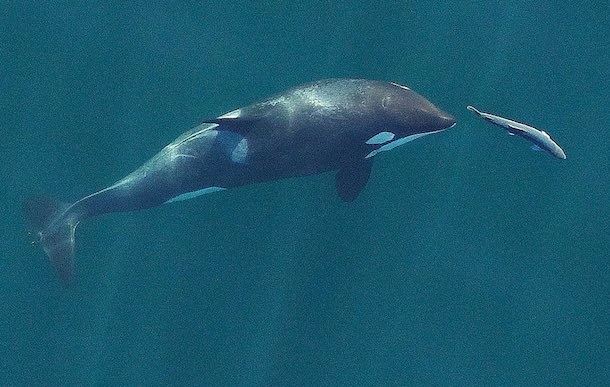forum
library
tutorial
contact

Destroying a Fishery
Won't Save Killer Whales
by Dr. Wally Pereyra
Capital Press, May 16, 2020
|
the film forum library tutorial contact |

|
Destroying a Fishery
by Dr. Wally Pereyra
|
 A Seattle-based federal judge will soon decide the fate of some 1,600 Southeast Alaska salmon trollers -- fishermen who are already looking at the lowest allotment of chinook in 20 years, largely due to the past three Pacific Salmon Treaty agreements that have cut their allocation by two-thirds.
A Seattle-based federal judge will soon decide the fate of some 1,600 Southeast Alaska salmon trollers -- fishermen who are already looking at the lowest allotment of chinook in 20 years, largely due to the past three Pacific Salmon Treaty agreements that have cut their allocation by two-thirds.
These rural Alaska fishermen are today facing the unthinkable: being put out of business -- collateral damage as the result of a lawsuit filed by a Washington state-based NGO, the Wild Fish Conservancy (WFC), against the National Marine Fisheries Service (NMFS).
In the lawsuit, WFC seeks a preliminary injunction to stop the chinook troll fishery, effective July 1, 2020, alleging that NMFS has failed to allow enough chinook salmon to return to Puget Sound to feed endangered Southern Resident Killer Whales (SRKW). If the court grants the injunction and closes the fishery, there will be disastrous consequences, not just to the fishermen but to Alaska's rural economy, already hard-hit by COVID-19, and the loss of tourism and oil revenues.
The Northwest Aquaculture Alliance (NWAA), where I serve on the board of directors, stands in solidarity with the Alaska Trollers Association and others in seeking comprehensive solutions facing the SRKW population and maintaining the already-approved troll fishery. All of us who produce seafood, wild and farmed, should work together to find innovative solutions to complex problems facing the environment and the food supply.
The S.E. Alaska troll salmon fishery is highly regulated, authorized and permitted under the Salmon Fishery Management Plan (FMP) of the North Pacific Fishery Management Council, which has delegated regulatory authority to the State of Alaska in accordance with the Magnuson-Stevens Fishery Conservation Act, the Pacific Salmon Treaty and other applicable federal laws. This complex web of regulations not only ensures that chinook salmon populations are sustainably managed, and ensures that these regulations take into account other considerations including essential fish habitat, and wild salmon and fishery impacts to other animal populations, including killer whales.
Many smart scientists are working on the SRKW issue, and most agree that many factors are involved in the situation facing these whales. Notably, the Salmon FMP states that the most important causes for the decline and extirpation of chinook salmon populations include habitat degradation, dams on the Columbia River, urbanization, agriculture land use, water diversions, mining and logging.
Since 1990, the Salmon FMP has been amended 11 times to address changes in the law, new information and new analyses. This amendment process is robust and provides for stakeholder input at multiple levels. It is disingenuous for the WFC to attempt to shut down this valuable fishery at the 11th hour rather than work for changes through the open FMP amendment process as well as those of the State of Alaska. We argue that sustainable harvests from fishing are a minor impact by comparison to other factors.
Why, then, is WFC seeking to shut down the S.E. Alaska troll fishery with devastating impacts to these rural fishermen, their families, and coastal communities?
As a 50-year veteran of the Alaska fishing industry, I would like to offer the WFC a better solution.
If you really want to help the whale population, please withdraw your lawsuit and preliminary injunction request, and instead work with all stakeholders to:
The WFC legal document alleges that the “Southern Resident Killer Whale population is at an increasingly high risk of extinction primarily due to insufficient prey (Knudsen Declaration -- 108-10, 266)”. Accordingly, WFC should support measures to provide farm-reared lipid-rich salmon to these animals. Such a program could alleviate any short-term extinction risk while other longer-term programs to increase natural and hatchery production of chinook salmon prey for the SRKW are identified and implemented.
The WFC makes a big issue out of the delay in implementation of NMFS's proposed mitigation measures to increase hatchery production of chinook salmon. Such concern should elicit whole-hearted support from WFC to immediately implement a directed feeding program with lipid-rich salmon.
We suggest that WFC should join with other stakeholders working to improve freshwater and marine habitats which shellfish and finfish alike need to flourish.
Taking legal action to shut down a scientifically managed and authorized troll salmon fishery will do little or nothing for the endangered SRKW but will certainly economically damage family fishermen and their small coastal communities.
learn more on topics covered in the film
see the video
read the script
learn the songs
discussion forum
